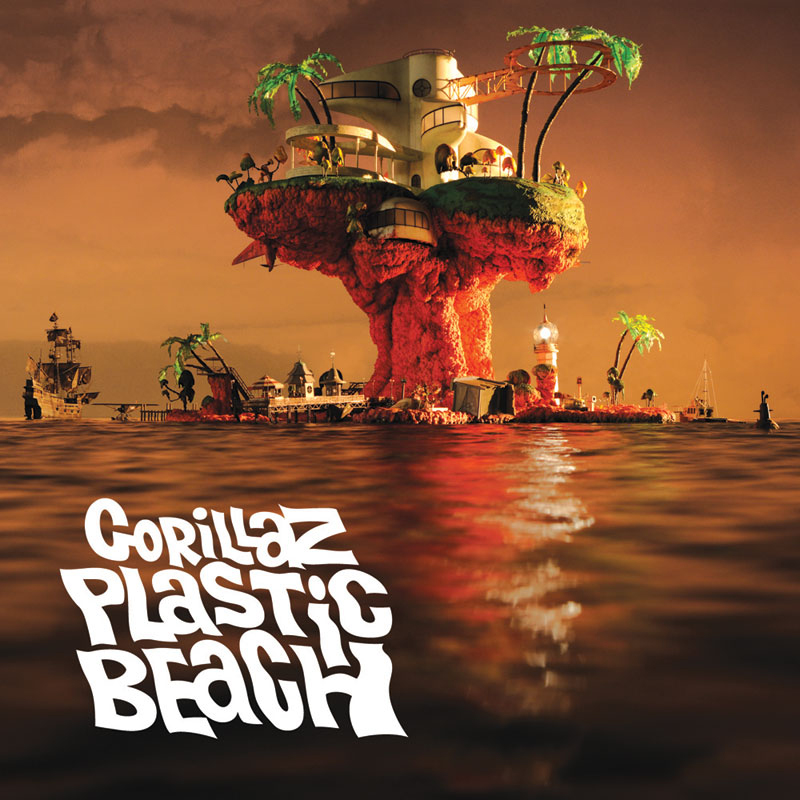It’s pretty clear that Damon Albarn isn’t particularly interested in being a conventional rock star these days. That, and not any personal differences between him and Graham Coxon, was the reason that Blur elected not to record a new album or do more shows after their widely acclaimed summer 2009 reunion. Listening to Plastic Beach, the third studio album from Albarn’s cartoon-based side project Gorillaz, it is evident that the Blur frontman’s lack of interest in attaching his name to an exercise in nostalgia extends to his endeavors outside of his day job.
Gorillaz has always been a hip-hop project in some capacity, be it in the Beck sense of the term on the group’s self-titled 2002 debut or in the culture-hopping, MIA sense on its stellar 2005 follow-up, Demon Days. Plastic Beach is harder to categorize. If Danger Mouse, Albarn’s chief collaborator on Demon Days, had been on a Mars Volta kick when he and Cee-Lo started Gnarls Barkley, they might have sounded like this. Plastic Beach is Albarn’s most expansive, least song-based album to date. There isn’t a classic single, a “Clint Eastwood” or ”Feel Good Inc.,” on here (although first single “Stylo” comes close). This actually works to the benefit of the album; Plastic Beach derives its success not from memorable songs but from memorable musical turns of phrase. The impact of the synth that drops about a minute into early standout “Rhinestone Eyes” and the way the syncopated horns and live drums elevate the energy halfway through the UK grime-flavored “Sweepstakes” give the album the feel of an exceptionally well-paced DJ set, seamlessly blending orchestral flourishes, gorgeous indie-pop (“On Melancholy Hill”), goofy rap (“Superfast Jellyfish,” not all that dissimilar to Charles Barkley’s Taco Bell commercial), and angular techno.
Plastic Beach is a change in focus for the group. On the debut and Demon Days, Gorillaz was presented as a fictional band of four cartoon characters with distinct personalities. On the new album, Albarn reinvents it as a clearinghouse for his musical whims that the members of Blur may not have been as receptive to. He takes advantage of the liberties that come with working under the name of a fictional group by assembling the most diverse cast of players on a Gorillaz record to date—this is probably the only time you’ll ever hear Bobby Womack, Snoop Dogg, the Clash’s Mick Jones and Paul Simonon, and Lou Reed on the same album. Reed is impeccably nonchalant on “Some Kind of Nature,” while Mos Def turns in one of the most unusual performances of his career, channeling Dizzee Rascal on “Sweepstakes,” which somehow doesn’t sound out of place at all following the most pop-friendly one-two on the album, Albarn’s stunning “On Melancholy Hill” and “Broken.”
It is pointless to compare Plastic Beach to Gorillaz’ other masterpiece, Demon Days. Their relationship is not that different than the one between OK Computer and Kid A—one is a collection of terrific, forward-thinking individual songs, and the other is an album more dependent on mood than hooks that still manages to worm its way into your consciousness. It speaks to Albarn’s skill both as a producer and as a songwriter that he has created an album-length work that manages to make these disparate styles feel like one idea. The album begins with Snoop Dogg’s iconic drawl and ends with Bobby Womack’s soulful growl, and doesn’t treat the two differently. Albarn has no qualms about sticking rappers Bashy and Kano on the same track as the National Orchestra for Arabic Music on “White Flag,” which finds a middle ground between a Bollywood soundtrack and a Super Mario Bros. soundtrack. This anything-goes approach makes Plastic Beach equally enjoyable on the surface level and rewarding of closer attention. I get that people are mad the Blur reunion isn’t going to continue, but when he’s made one of the most forward-thinking pop records in recent memory with Gorillaz, can you really begrudge him not wanting to play decade-old Britpop?

